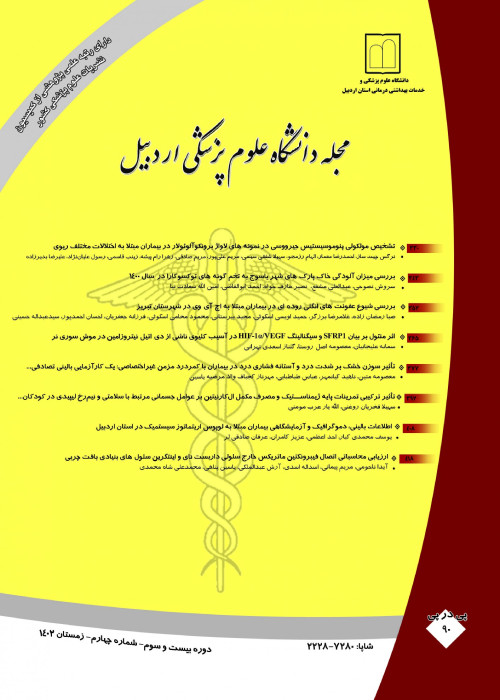Prevalence and Antibiotic Resistance Pattern of Candida spp. Isolated from Pregnant Women Referred to Health Centers in Ardabil, Iran
Author(s):
Abstract:
Background and Objectives
Candidiasis is a fungal infection which is caused by Candida spp. Candida albicans is the most common agent of candidiasis. This infection may cause various side effects during pregnancy including prematurity, chorioamnionitis, candidal pneumonia, and systemic candidiasis of infants. This research was conducted for determining the prevalence and antibiotic resistance pattern of Candida spp, collected from pregnant women admitted to health centers in Ardabil, Iran.Methods
Totally, 408 subjects were included in this study. Demographic data and risk factors were recorded using a questionnaire. Two swab samples were taken from vulvovaginal mucus. One swab was used for preparing smear and direct microscopic examination and the second one used for cultivating the specimen. After identification of Candida spp., antimicrobial resistance pattern was determined by disk diffusion method against Fluconazole, Ketoconazole, Clotrimazole, Nystatin and Amphotericin B. Results were interpreted according to CLSI guidelines. The data were analyzed by χ2 and t-test using SPSS-19.Results
Out of 408 subjects, 143 cases (35%) were positive for candida spp. The Candida albicans with 119 (83.2%) cases was the most prevalent species followed by Candida glabrata, Candida krusei, Candida parpsilosis and Candida tropicalis.According to disk diffusion test, overall 116 (81.1%) isolates were resistant to Fluconazole, 100 (69.9%) to Ketoconazole, 67 (46.9%) to Clotrimazole and 25 (17.5%) to Amphotericin B. Candida spp. had a highest sensitivity (118, 82.5%) to Nystatin. For Candida albicans 97(81.5%) isolates were resistant to Fluconazole and 99(83.2%) isolates to Nystatin. For Candida glabrata 10 (90.9%) isolates were resistant to Fluconazole, and 9(81.8%) sensitive to Nystatin.Conclusion
According to the results of this study, vulvovaginal candidiasis is prevalent among pregnant women in Ardabil and isolates were significantly resistant against commonly used antifungal drugs. Nystatin was the most effective against Candida spp. As antibiogram for fungal agents is not routinely performed, the similar periodical studies could be useful for choosing appropriate antibiotics in treatment of vulvovaginal candidiasis.Keywords:
Language:
Persian
Published:
Journal of Ardabil University of Medical Sciences, Volume:16 Issue: 62, 2017
Pages:
409 to 421
magiran.com/p1640678
دانلود و مطالعه متن این مقاله با یکی از روشهای زیر امکان پذیر است:
اشتراک شخصی
با عضویت و پرداخت آنلاین حق اشتراک یکساله به مبلغ 1,390,000ريال میتوانید 70 عنوان مطلب دانلود کنید!
اشتراک سازمانی
به کتابخانه دانشگاه یا محل کار خود پیشنهاد کنید تا اشتراک سازمانی این پایگاه را برای دسترسی نامحدود همه کاربران به متن مطالب تهیه نمایند!
توجه!
- حق عضویت دریافتی صرف حمایت از نشریات عضو و نگهداری، تکمیل و توسعه مگیران میشود.
- پرداخت حق اشتراک و دانلود مقالات اجازه بازنشر آن در سایر رسانههای چاپی و دیجیتال را به کاربر نمیدهد.
دسترسی سراسری کاربران دانشگاه پیام نور!
اعضای هیئت علمی و دانشجویان دانشگاه پیام نور در سراسر کشور، در صورت ثبت نام با ایمیل دانشگاهی، تا پایان فروردین ماه 1403 به مقالات سایت دسترسی خواهند داشت!
In order to view content subscription is required
Personal subscription
Subscribe magiran.com for 70 € euros via PayPal and download 70 articles during a year.
Organization subscription
Please contact us to subscribe your university or library for unlimited access!



